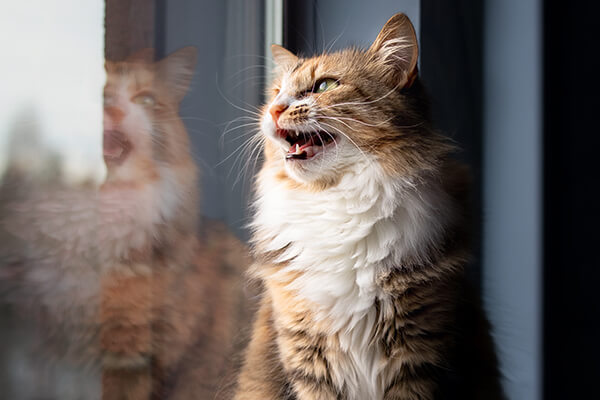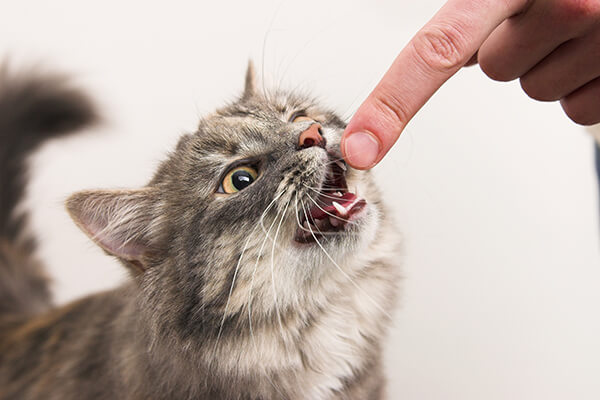Cat sneezing: Causes and tips


Share
Just like humans, it’s pretty common for cats to sneeze sometimes. The odd sneeze now and then might be simply down to dust or something tickling their nose, but it’s important to keep an eye on any cat sneezing to make sure they’re not ill or suffering from allergies, to ensure their wellbeing. This cat sneeze guide looks at why do cats sneeze, and what to do if you think your fur baby might be unwell.
Why do cats sneeze?
Cats can sneeze for all sorts of reasons, just like we can. Common causes of cat sneezing include dust or perfume particles being inhaled, irritation from a foreign body, or even their own fur getting into their little nose. However, repeated sneezing can also be a sign of illness, including sinusitis, respiratory infections (such as cat flu) or allergies.
Environmental factors can play a part, as cats can be sensitive to pollen and other irritants just like humans can, but if your cat’s sneezing a lot it can indicate other health issues such as dental problems, or even dietary reactions to milk and new foods.
Do cats sneeze a lot when sick?
Unfortunately, a lot of cat infections involve sneezing. If your cat sneezes repeatedly, or if their cat sneeze involves mucus or blood, a vet will need to examine your pet to rule out anything more serious. Try to observe your cat to see if they’re behaving normally and seem happy, content and eating as usual. A cat constantly sneezing is potentially a cause for concern.
Signs of a respiratory infection - such as cat flu - often include repeated coughing, discharge or mucus from the eyes or nose and a possible fever, making your cat seem quieter, generally unwell and/or off their food. Infections can be viral or bacterial, so it’s important for a vet to take a look at them to prescribe the right treatment.
When should I worry about my cat sneezing?
Excessive cat sneezing is worth noting, as even if your cat appears well, they could be harbouring a tooth infection or have something stuck in there (such as a feather from a pillow). If your cat keeps sneezing, try to make a note of when or why it happens. A cat's sense of smell is far superior and more sensitive than ours, so it might be that cigarette smoke, strong sunlight, certain cleaning products or a specific type of cat litter sets it off.
Pet owners often know instinctively if their fur baby is unwell. If your cat keeps sneezing a lot, or they are extra tired, unwilling to play, snore or drool more than usual, become aggressive or start growling, hide away more or exhibit any other sudden change in behaviour these are all things to watch out for and the vet is your best bet to check your cat over.
Do cat colds go away on their own?
Cats, like humans, can get colds every now and then. Healthy cats with colds often recover from their colds within 10 days, but if your cat has underlying medical conditions it may take longer. Cat colds are viral so you’ll usually care for your cat at home, and will be advised to reduce stress whilst they recover. A cat constantly sneezing should be looked at by a vet.
It’s important to rule out other reasons why your cat keeps sneezing first though, before assuming your cat has a cold, as many viruses can be highly infectious and may put other cats at risk. There could also be a less common cause of your cat sneezing and feeling unwell.
Cat flu is the most common respiratory virus for cats, and it’s highly contagious but preventable. It’s vital to have your pet fully vaccinated with their primary kitten vaccines, as well as their adult annual booster jabs, to prevent infection.
Cat sneezing a lot, how to stop it?
Once you’ve ruled out potentially more serious conditions for your cat sneezing a lot, it’s time to look into what causes their sneezing at home. Remove any items which may set off the sneezing, and air your home out to prevent dust building up. Make sure that any cleaning products used are pet safe, and avoid smoking, using strong air fresheners or burning strong-smelling candles or aromatherapy oil diffusers indoors.
Grooming your cat regularly can help to avoid cat sneeze attacks, as well as using dust-extracted cat litter and making sure they have a balanced diet suitable for their age. Having a cat-friendly environment will help to support the wellbeing of your pet, and a vet will be a good port of call for expert advice tailored to your specific breed.
What can I give my cat for sneezing?
Some cat owners recommend over-the-counter medications to ease cat sneeze problems, and at-home solutions such as using steam therapy in the bathroom for cat colds, but these should only be used following medical advice. Treating your cat at home without having an expert veterinary opinion first could lead to a more serious problem being overlooked.
The best solution is to maintain a clean environment with a safe space for your pet to relax, as well as having regular check-ups from a vet. It’s also important for your cat to be up-to-date with their vaccinations to prevent many of the illnesses which cause sneezing. If your cat is recovering, it may help to create a calm, quiet space for them to rest and get well again.
Cat parents can often be concerned when they hear their pet sneezing, but it’s not necessarily something to worry about. The key is to observe your cat’s overall behaviour and wellbeing, as a cat constantly sneezing can indicate a trip to the vet is needed, to rule out anything more serious. Read more about caring for your cat and bonding with your cat on our blog.











